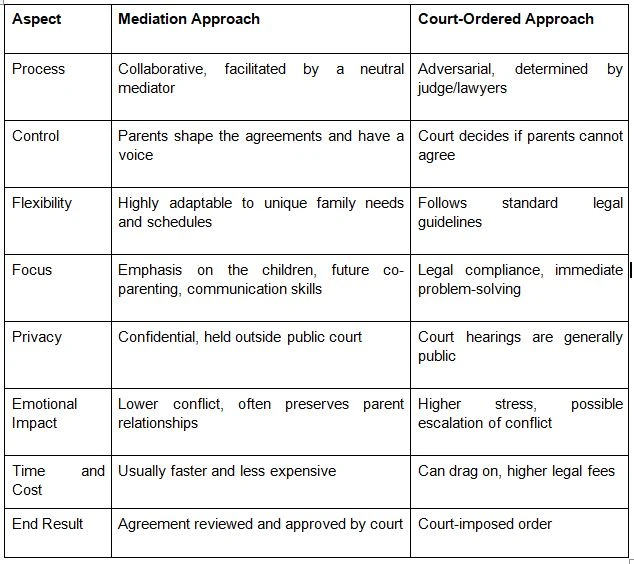Key Takeaways
● Mediation gives parents a voice, preserves dignity, and nurtures lifelong co-parenting skills; court orders remove this flexibility and control.
● Parenting plan mediation focuses on children’s needs now and into the future, tailored, creative, and practical for your family’s situation.
● Cost and stress are dramatically reduced through mediation.
● The skills and communication learned through mediation help families long after paperwork is signed.
Differences Between Mediation and Court-Ordered Parenting Plans in Minnesota
Parenting after divorce can be fraught with anxieties. Every parent wants what’s best for their children, but major life changes challenge even the most amicable families. In Minnesota, crafting a clear parenting plan is essential, and how you create it may shape your family’s wellbeing for years to come. If you’re exploring options, two main approaches stand out: mediation and traditional court-ordered plans. While both serve the same goal, their processes and outcomes are remarkably different.
This article will dig deep into the distinction between mediation and court-ordered plans, equipping you to make an informed and empowered choice. Read on to understand how mediation facilitates healthier co-parenting, and why more Minnesota families are choosing to keep control in their own hands, not the court’s.
Why Parenting Plans Matter
A “parenting plan” is a roadmap for how separated couples will raise their children. It covers everything from where the children will live, to the logistics of pick-ups and drop-offs, holidays, communication, and decision-making about things like school and healthcare. In Minnesota, these plans are required by law in any dissolution involving children, whether through mediation or litigation.
But these aren’t just legal documents, they are blueprints for children’s futures. The plan you create needs to be as unique as your family, and it should reflect your children’s needs and best interests, not just legal checkboxes.
What Is Parenting Plan Mediation?
Parenting plan mediation is a voluntary, confidential process led by a neutral mediator, often a family mediation professional certified in Minnesota. This process gives parents the space and support to have open, solution-focused discussions about co-parenting issues, always with their children’s wellbeing at the center.
Instead of adversarial negotiation or rigid courtroom rules, mediation is collaborative. Parents work together to create practical arrangements and long-term agreements. At The Bridging Coach, this process goes beyond just discussing logistics: it addresses underlying emotions and fears, supports healthy communication, and encourages parents to think about their children’s long-term growth.
Mediation Focuses on:
● Clarity and flexibility in parenting schedules
● Child-focused decision making
● Creative solutions that work for unique family needs
● Proactive, non-adversarial problem-solving
● Skills for positive co-parenting and reduced future conflict
Sessions are tailored to each family, and the mediator guides the conversation with tools that build understanding and respect. Agreements reached in mediation are written up in a documented parenting plan, which is submitted to the court for approval and becomes legally binding.
What Is a Court-Ordered Parenting Plan?
A court-ordered parenting plan is developed when parents can’t reach agreement on their own. In this scenario, the Minnesota family court, guided by state law and precedent, ultimately creates the parenting schedule and rules for both parents. This may be after adversarial hearings, arguments between attorneys, or the judge interpreting what’s “best.” The outcome becomes a legally binding order.
In this structure, each parent may have an attorney advocating for their interests, and the process can sometimes become contentious. While judges focus on children’s best interests, the process itself often removes flexibility, creativity, and the voices of the parents from key decisions.
Key Differences: Mediation vs. Court-Ordered Parenting Plans

Why Families in Minnesota Choose Parenting Plan Mediation
Minnesota families are increasingly opting for mediation, and for good reason. Mediation doesn’t erase differences or make everything easy, but it gives parents the greatest chance to build a plan that actually works. With a CDC Certified Divorce Coach® and Rule 114 Qualified Mediator guiding the process, like at The Bridging Coach, families find:
● Greater confidence in their arrangements, because they were part of crafting them
● Practical parenting plans that actually fit their unique schedules, travel needs, and child development stages
● Less adversarial relationships, minimizing the impact of tension on children
● Tools and strategies for better future communication, essential for co-parents
● The dignity of keeping private family matters outside of public court
Mediation is also ideal for addressing “two address family” issues, smoothing transitions, and helping parents adjust to new routines and roles post-divorce. Co-parenting support is ongoing, meaning as children grow and situations change, facilitated adjustments can happen outside of a courtroom, quickly and respectfully.
What Happens After a Mediation Parenting Plan?
Once you agree on a parenting plan in mediation, your mediator finalizes it in writing. Both parents review it before signing. The plan is then submitted to the court, reviewed by a judge, and, if it aligns with Minnesota law, it becomes a court order. This process is straightforward, allows both parents to move forward, and avoids multiple court dates and public hearings.
If disagreements arise later, families can return to mediation any time to adjust the plan as needed, saving everyone from the stress and costs of returning to litigation.
Real-World Example: A Family-Centered Approach
Consider a separated family living in Maple Grove, MN. The parents want to work together, but communication is strained. Through parenting plan mediation, they meet virtually with a Rule 114 Qualified Mediator. They bring their concerns, different work schedules, school transitions for their kids, complex holiday traditions.
Over several sessions, the mediator helps them clarify their core goals and encourages them to focus on the children’s experience above all. Together, they develop a customized parenting plan that accounts for each child’s emotional needs and practical realities. They leave the process with a roadmap they created together, one they truly believe will work.
The result? Fewer angry calls, kids who feel safe and loved by both parents, and a new spirit of cooperation.
If you’re a parent facing divorce or custody changes in Minnesota, it’s natural to have questions. Will your children be okay? Can you and your co-parent work things out? Mediation at The Bridging Coach offers a compassionate, experienced guide to help you create a parenting plan you believe in, and a co-parenting partnership that supports your children’s well-being now and in the years to come.
Ready to build a future that puts your children first? Contact The Bridging Coach today to learn more about parenting plan mediation, and start your family’s next chapter on the strongest possible footing.


